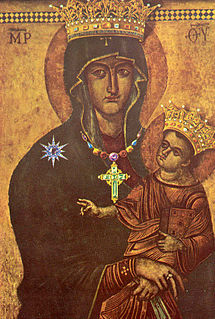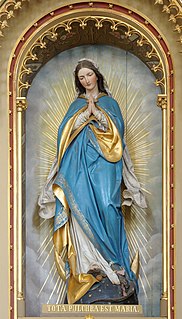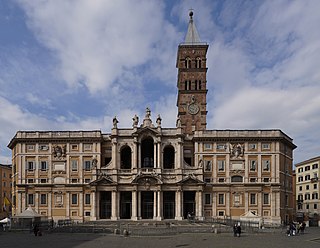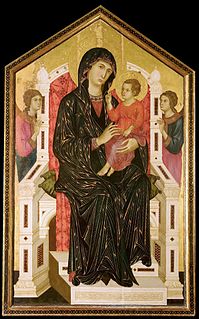
Pope Benedict XIV, born Prospero Lorenzo Lambertini, was head of the Catholic Church and ruler of the Papal States from 17 August 1740 to his death in 1758.

Queen of Heaven is a title given to the Virgin Mary, by Christians mainly of the Catholic Church and, to a lesser extent, in Anglicanism, Lutheranism, and Eastern Orthodoxy.
A papal renunciation also called a papal abdication, occurs when the reigning pope of the Catholic Church voluntarily steps down from his position. As the reign of the pope has conventionally been from election until death, papal renunciation is an uncommon event. Before the 21st century, only five popes unambiguously resigned with historical certainty, all between the 10th and 15th centuries. Additionally, there are disputed claims of four popes having resigned, dating from the 3rd to the 11th centuries; a fifth disputed case may have involved an antipope.

Catholic Mariology is Mariology in Catholic theology. According to the Immaculate Conception taught by the Catholic Church, she was conceived and born without sin, hence Mary is seen as having a singular dignity above the saints, receiving a higher level of veneration than all angelic spirits and blessed souls in heaven. Catholic Mariology thus studies not only her life but also the veneration of her in daily life, prayer, hymns, art, music, and architecture in modern and ancient Christianity throughout the ages.
Quattuor abhinc annos is the incipit of a letter that the Congregation for Divine Worship and the Discipline of the Sacraments sent on 3 October 1984 to presidents of episcopal conferences concerning celebration of Mass in the Tridentine form.

A Coronation Mass is a Eucharistic celebration, in which a special liturgical act, the coronation of an image of Mary, is performed.
Pastor bonus is an apostolic constitution promulgated by Pope John Paul II on 28 June 1988. It instituted a number of reforms in the process of running the central government of the Catholic Church.

Mary, the mother of Jesus in Christianity, is known by many different titles, epithets, invocations, and several names associated with places.
Gloriosam Reginam is a letter of Pope Pius XII to the Polish episcopate, to protest against the persecution of the Church in Poland, and, to commemorate the 300th anniversary of Jasna Góra, the Polish sanctuary of the Virgin Mary. The invincible Mother of God, who the pope says watches over the freedom for Poland, will most certainly assist.

Ad Caeli Reginam is an encyclical of Pope Pius XII, given at Rome, from St. Peter's Basilica, on the feast of the Maternity of the Blessed Virgin Mary, the eleventh day of October, 1954, towards the end of the Marian year, in the sixteenth year of his Pontificate. The encyclical is an important element of the Mariology of Pope Pius XII. It established the feast Queenship of Mary.

Fulgens corona is an encyclical by Pope Pius XII, given at St. Peter's, Rome, on 8 September 1953, the Feast of the Nativity of the Blessed Virgin Mary, in the fifteenth year of his Pontificate. The encyclical proclaims a Marian year for 1954, to commemorate the centenary of the definition of the dogma of the Immaculate Conception of the Virgin Mary.
Marian feast days are specific holy days of the liturgical year recognized by Christians as significant Marian days for the celebration of events in the life of the Blessed Virgin Mary and her veneration. The number of Marian feasts celebrated, their names can vary among Christian denominations.

The Mariology of the popes is the theological study of the influence that the popes have had on the development, formulation and transformation of the Roman Catholic Church's doctrines and devotions relating to the Blessed Virgin Mary.

Catholic Marian churches are religious buildings dedicated to the veneration of the Blessed Virgin Mary. These churches were built throughout the history of the Catholic Church, and today they can be found on every continent including Antarctica. The history of Marian church architecture tells the unfolding story of the development of Catholic Mariology.

Mariological papal documents have been a major force that has shaped Roman Catholic Mariology over the centuries. Mariology is developed by theologians on the basis not only of Scripture and Tradition but also of the sensus fidei of the faithful as a whole, "from the bishops to the last of the faithful", and papal documents have recorded those developments, defining Marian dogmas, spreading doctrines and encouraging devotions within the Catholic Church.

Ubi primum is an encyclical of Pope Pius IX to the bishops of the Catholic Church asking them for opinion on the definition of a dogma on the Immaculate Conception of the Virgin Mary. It was issued on February 2, 1849.

Le pèlerinage de Lourdes is the only encyclical of Pope Pius XII issued in French. It includes warnings against materialism on the centenary of the apparitions at Lourdes. It was given at Rome, from St. Peter's Basilica, on the feast of the Visitation of the Most Holy Virgin, July 2, 1957, the nineteenth year of his pontificate.
The Pontifical Council for Promoting the New Evangelization, also translated as Pontifical Council for Promoting New Evangelization, was a pontifical council of the Roman Curia whose creation was announced by Pope Benedict XVI at vespers on 28 June 2010, eve of the Feast of Saints Peter and Paul, to carry out the New Evangelization. On 5 June 2022, the department was merged into the Dicastery for Evangelization.
The Apostolic Vicariate of Beirut is a Latin Rite missionary pre-diocesan exempt jurisdiction of the Catholic Church in Lebanon, where otherwise Eastern Catholics are far more numerous. In 2010, there were 15,000 baptized. Its current bishop is Cesar Essayan.










